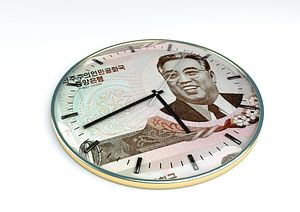North Korea’s decision to create its own time zone by setting its clocks back 30 minutes, returning to the time zone before Imperial Japan changed it in 1912, is significant not so much for its statement about Japan but for what it says of Pyongyang’s view of a reunified Korean peninsula. For years, the North has gone to great lengths to cement its independence, driving home its “us against the world” message to its own people.
Changing the clocks back is yet another example of this, one that creates another division with the South to add to the many that already exist. For all the small reunification projects underway, reunification cannot occur while the Kim regime holds power. And the Kim family have shown if nothing else a ruthless ability to survive, its number one aim. For it, anything else, including talk of reunification, are just a political front.
These days, though, it is more than just economic and political reality that separates the two Koreas. Take the Korean language. Almost one third of words in daily common use in the South do not exist in the North. For instance, South Korea has incorporated many English words into its vocabulary. This is one of the many problems defectors from the North have to contend with when adjusting to life in the South. That gap will only continue to grow.
Views on reunification have also changed, particularly among Korea’s young, who mostly see North Korea as a remote, alien world. They have no direct family ties, and are technologically savvy, global citizens who see only a wildly different culture. It is almost impossible for them to experience the same emotional attachment that the older generation feels. How could they? They have not lost loved ones and do not have bitter wartime memories. Pyongyang may be just 193 km from Seoul, but in so many cultural aspects, it is light years away. Millennia of shared history will always remain but 70 years apart in an era of unprecedented change has taken its toll.
Currently there is still a will for reunification, especially among the large elderly population. There are enough Koreans who still remember the enormous tragedy of the division of the peninsula, and the family members lost to the North, never to be seen again. But this generation is slowly disappearing, and it is not at all clear that the next generation will be prepared to sacrifice their own living standards to help their Northern neighbors even should that opportunity present itself.
Last year, Korea’s top financial regulator estimated that the economic cost of reunification would be $500 billion over a period of 20 years, assuming everything went smoothly. Other estimates have it much higher, and point to other potential problems such as the flood of cheap labor, undercutting wages. Taking on this huge burden would require astonishing political will in the South, something that may well have been possible before but which is far less certain today.
Germany, which did have the political will along with massive resources, still struggles today with the legacy of reunification. Korea’s division runs much deeper, and has lasted for 25 more years and counting. The economic disparity on the peninsular are far beyond those that existed between East and West Germany in 1990, and the cultural gap is greater.
President Park Geun-hye was right to lament the changing of the clocks, saying it “runs counter to efforts to foster inter-Korea cooperation and to achieve reunification.” Clearly, the longer the Kim family retains its grip on the North, the greater the challenges reconciliation will present. And in the South, the Miracle on the Han River has changed not only the economy but the values of its people. When does “one country,” stop becoming one. That is a question which policymakers in South Korea will not publicly answer but surely know must be addressed.
Jack Hands is a former political advisor, having worked in the U.K. and European parliaments. He has written for several major political blogs, notably Conservative Home. Currently based in Korea, he is a former founder of North Korea Campaign UK, which campaigned for awareness of the plight of political prisoners inside North Korea. Follow him on Twitter @jackhands1.

































